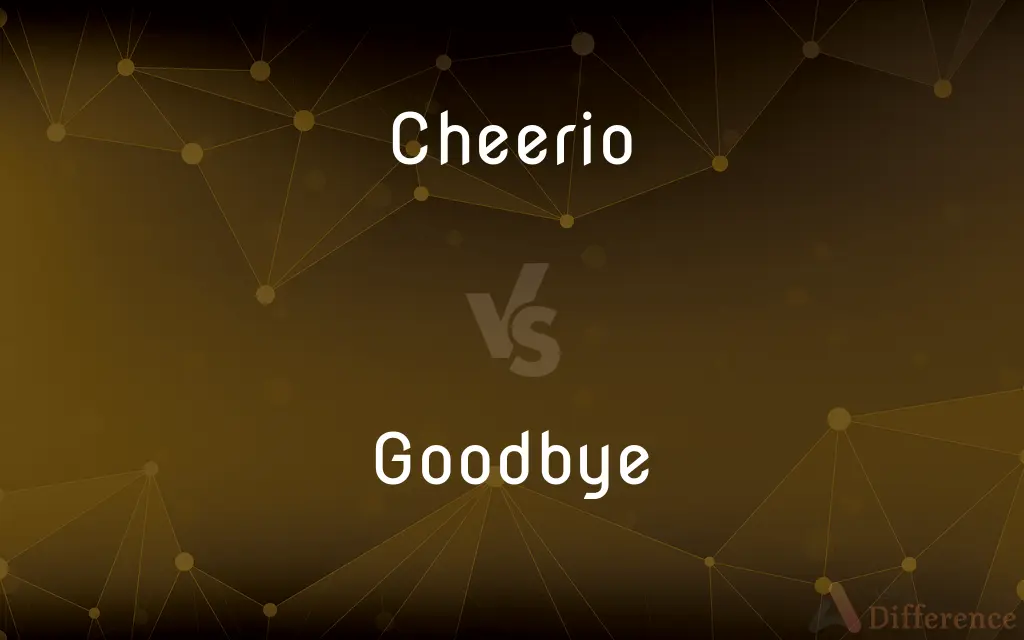Cheerio vs. Goodbye — What's the Difference?
By Maham Liaqat & Fiza Rafique — Updated on March 25, 2024
Cheerio is a casual, British farewell, often light-hearted, whereas goodbye is more formal and universal in use.

Difference Between Cheerio and Goodbye
Table of Contents
ADVERTISEMENT
Key Differences
Cheerio is a colloquial, friendly way to say farewell, typically used in British English. It conveys a sense of warmth and informality, often implying that the departure is temporary. On the other hand, goodbye is a conventional parting phrase used globally, suitable for both formal and informal situations. It does not inherently carry a specific tone or suggest the length of the separation.
Cheerio, being distinctly British, carries cultural nuances and is less common in other English-speaking countries. Whereas goodbye is recognized and used worldwide, transcending cultural boundaries.
While cheerio may convey a lighter, more upbeat mood, suggesting an optimistic view of meeting again, goodbye is neutral and can be used in both happy and solemn contexts. This makes goodbye a more versatile option for farewells.
Cheerio is often associated with casual, everyday encounters, such as leaving a friend's house or ending a casual conversation. Goodbye, however, can mark both casual departures and more significant, emotional farewells, such as leaving a job or moving away.
Despite their differences, both cheerio and goodbye fulfill the same basic function of marking the end of an interaction or meeting. The choice between them can reflect the speaker's personality, the context of the farewell, or cultural habits.
ADVERTISEMENT
Comparison Chart
Origin
British English
Middle English (godbwye, god be with ye)
Formality
Informal
Formal and informal
Mood
Light-hearted, optimistic
Neutral, adaptable to context
Usage
Primarily in the UK
Worldwide
Context
Casual encounters, temporary separations
Any type of farewell
Compare with Definitions
Cheerio
A light-hearted parting.
With a cheerful cheerio, he closed the door behind him.
Goodbye
A conventional expression used at parting.
She quietly said goodbye and left the room.
Cheerio
A British informal farewell.
He waved and said cheerio as he left the room.
Goodbye
Often used in significant, emotional farewells.
With a heavy heart, he whispered goodbye to his old home.
Cheerio
Used to express good wishes.
Cheerio! See you next week, she called out.
Goodbye
Indicates the end of an interaction or relationship.
Goodbye, everyone. I'll miss you all, she said on her last day.
Cheerio
Can be used as a greeting in casual, friendly contexts.
Cheerio! How have you been? he greeted his friend.
Goodbye
Suitable for both formal and informal contexts.
Goodbye, Mr. Smith, he said at the end of the interview.
Cheerio
Signifies optimism for future meetings.
Cheerio, then. Let's catch up soon, he suggested.
Goodbye
Universally understood and used.
Goodbye! Safe travels, she said to her international friend.
Cheerio
Used as a greeting or farewell.
Goodbye
Used to express an acknowledgment of parting.
Cheerio
Goodbye, an interjection said upon parting.
Goodbye
An acknowledgment at parting, especially by saying "goodbye."
Cheerio
(rare) Hello; a greeting.
Goodbye
An act of parting or leave-taking
Many sad goodbyes.
Cheerio
A small saveloy often consumed with tomato sauce at parties.
Goodbye
; a formula used to another person or persons when the speaker, writer, or person addressed is departing.
Cheerio
A farewell remark;
They said their good-byes
Goodbye
An utterance of goodbye, the wishing of farewell to someone.
They made their good-byes.
We have time for a short goodbye.
Goodbye
To say goodbye; to wish somebody farewell on parting.
Goodbye
A farewell remark;
They said their good-byes
Common Curiosities
Which farewell is more formal, cheerio or goodbye?
Goodbye is more versatile and can be formal or informal, making cheerio the less formal option.
Do both terms imply a temporary separation?
Cheerio often implies a temporary separation, whereas goodbye can be used for both temporary and permanent farewells.
Can "goodbye" carry emotional weight?
Yes, goodbye can be used in significant, emotional farewells.
What is the origin of "cheerio"?
Cheerio originated in British English as a friendly, informal farewell.
Can "goodbye" be used in both formal and informal settings?
Yes, goodbye is suitable for both formal and informal contexts.
How widely is "goodbye" recognized?
Goodbye is recognized and used worldwide.
Is "cheerio" used outside of the UK?
While understood, cheerio is less commonly used outside the UK.
Is "cheerio" informal?
Yes, cheerio is considered informal.
How do cultural differences affect the use of these farewells?
Cultural habits and familiarity with British English influence the choice between cheerio and goodbye.
Is "cheerio" appropriate for solemn occasions?
Cheerio is typically light-hearted and may not be suitable for very solemn occasions.
What mood does "cheerio" convey?
Cheerio conveys a light-hearted, optimistic mood.
What does "goodbye" signify?
Goodbye signifies the end of an interaction or relationship, without specifying the mood or duration of the separation.
Which term is older, cheerio or goodbye?
Goodbye has older origins, stemming from a contraction in Middle English.
Can "cheerio" be used as a greeting?
Yes, in casual, friendly contexts, cheerio can also be used as a greeting.
Are there situations where using "cheerio" would be inappropriate?
In very formal or solemn contexts, using cheerio might be seen as too casual or light-hearted.
Share Your Discovery

Previous Comparison
Result vs. Cause
Next Comparison
Perceive vs. ObserveAuthor Spotlight
Written by
Maham LiaqatCo-written by
Fiza RafiqueFiza Rafique is a skilled content writer at AskDifference.com, where she meticulously refines and enhances written pieces. Drawing from her vast editorial expertise, Fiza ensures clarity, accuracy, and precision in every article. Passionate about language, she continually seeks to elevate the quality of content for readers worldwide.














































